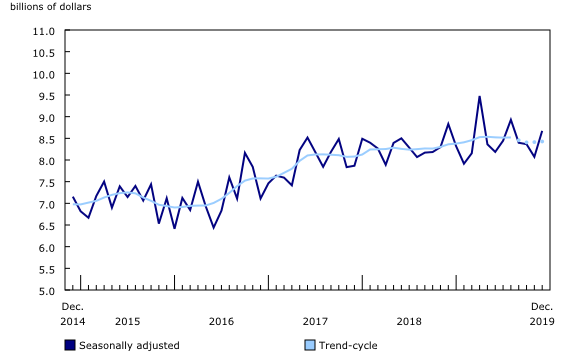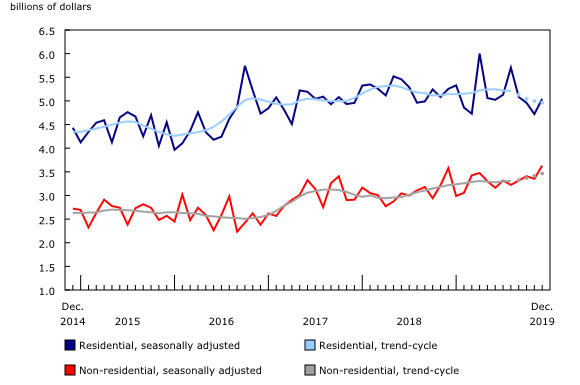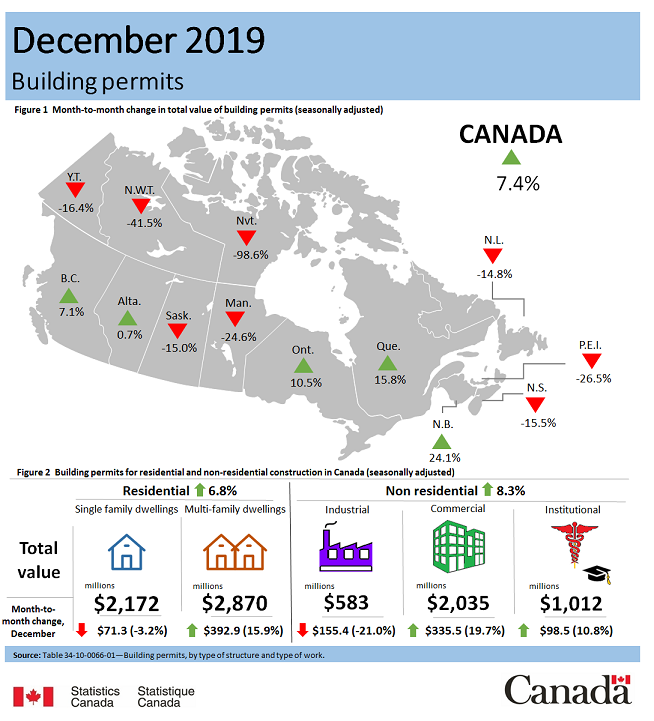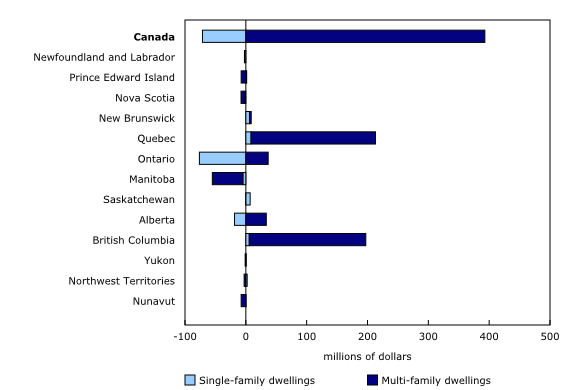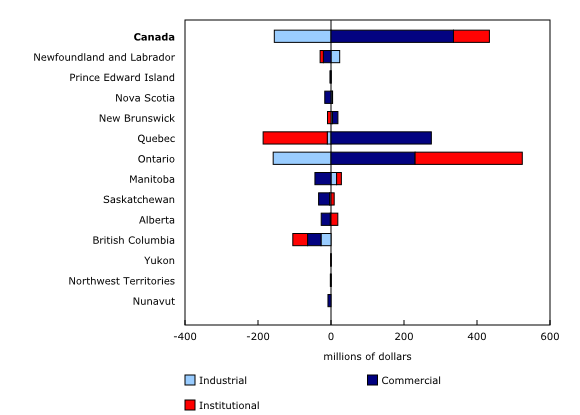Building permits, December 2019
Archived Content
Information identified as archived is provided for reference, research or recordkeeping purposes. It is not subject to the Government of Canada Web Standards and has not been altered or updated since it was archived. Please "contact us" to request a format other than those available.
Released: 2020-02-10
$8.7 billion
December 2019
7.4% 
(monthly change)
$48.4 million
December 2019
-14.8% 
(monthly change)
$24.4 million
December 2019
-26.5% 
(monthly change)
$112.2 million
December 2019
-15.5% 
(monthly change)
$93.2 million
December 2019
24.1% 
(monthly change)
$2,212.2 million
December 2019
15.8% 
(monthly change)
$3,444.6 million
December 2019
10.5% 
(monthly change)
$216.6 million
December 2019
-24.6% 
(monthly change)
$103.4 million
December 2019
-15.0% 
(monthly change)
$1,011.8 million
December 2019
0.7% 
(monthly change)
$1,399.3 million
December 2019
7.1% 
(monthly change)
$3.2 million
December 2019
-16.4% 
(monthly change)
$3.3 million
December 2019
-41.5% 
(monthly change)
$0.2 million
December 2019
-98.6% 
(monthly change)
The total value of building permits issued by Canadian municipalities increased 7.4% to $8.7 billion in December. Increases were reported in five provinces, led by Ontario (+10.5% to $3.4 billion) and Quebec (+15.8% to $2.2 billion). For 2019 overall, municipalities issued $102.4 billion worth of permits, up 2.6% compared with 2018.
For more information on housing, please visit the Housing Statistics Portal.
Value of residential permits up
The total value of permits for multi-family dwellings was up 15.9% to $2.9 billion in December, mostly due to large projects in the census metropolitan areas (CMAs) of Montréal and Vancouver.
Conversely, the total value of permits for single-family dwellings decreased 3.2% to $2.2 billion, with the largest decline in Ontario (-$76 million).
Increase in the value of commercial and institutional permits
The value of commercial permits rose 19.7% to $2.0 billion in December, largely due to plans for the multi-use commercial development, "Royalmount", in the CMA of Montréal.
Meanwhile, the value of institutional permits rose to its highest level since September 2017 (+10.8% to $1.0 billion), largely due to permits for the redevelopment of the Centre for Addiction and Mental Health in Toronto.
The total value of industrial permits declined 21.0% to $583 million following strong gains in November.
Annual review 2019
In 2019, municipalities issued $102.4 billion worth of permits, up 2.6% compared with 2018. Gains were reported in six provinces, with the largest increase in Ontario (+$2.8 billion). Alberta recorded the largest decrease (-$1.8 billion), with declines in all building types.
The value of permits in the CMA of Toronto increased 1.9% to $19.2 billion, while several other Ontario CMAs also reported notable gains. The CMA of Kitchener–Cambridge–Waterloo posted the largest increase in the country (+53.5% to $2.2 billion), largely due to an increase in the value of permits for multi-family dwellings.
The Edmonton CMA reported the largest decrease in the total value of building permits (-21.5% to $3.9 billion), accounting for more than half of the overall decline in Alberta. This was the fifth consecutive annual decrease in the CMA of Edmonton, reflecting the challenging economic environment in the province.
Building intentions in the non-residential sector increased 9.4% to $40.4 billion, with gains in seven provinces. All components reported increases, led by commercial permits (+7.5% to $23.2 billion).
Conversely, the value of permits in the residential sector declined 1.3% to $62.0 billion. The value of permits for single-family dwellings fell 4.9% to $26.5 billion, its lowest level since 2009. Permits for multi-family dwellings offset some of this decline, rising 1.5% to a record $35.5 billion.
Note to readers
Unless otherwise stated, this release presents seasonally adjusted data, which facilitate month-to-month comparisons by removing the effects of seasonal variations. For information on seasonal adjustment, see Seasonally adjusted data – Frequently asked questions.
The Building Permits Survey covers over 2,400 municipalities, representing 95% of the Canadian population. The communities representing the other 5% of the population are very small, and their levels of building activity have little impact on the total for the entire population.
Building permit data are used as a leading indicator of activity in the construction industry.
The value of planned construction activities presented in this release excludes engineering projects (such as waterworks, sewers or culverts) and land.
For the purposes of this release, the census metropolitan area of Ottawa–Gatineau (Ontario and Quebec) is divided into two areas: the Ottawa part and the Gatineau part.
Unless otherwise specified, the highlights refer to seasonally adjusted current dollars and are ranked in terms of dollar change rather than percentage change.
Building components
Single-family dwellings: Residential buildings containing only one dwelling unit (for example, single-detached house, bungalow, linked home [linked at the foundation]).
Multi-family dwellings: Residential buildings containing multiple dwelling units (for example, apartment, apartment condominium, row house, semi-detached).
Industrial buildings: Buildings used in the processing or production of goods, or related to transportation and communication.
Commercial buildings: Buildings used in the trade or distribution of goods and services.
Institutional and government buildings: Buildings used to house public and semi-public services, such as those related to health and welfare, education, or public administration, as well as buildings used for religious services.
Revision
Unadjusted data for the current reference month are subject to revision based on late responses. Data for the previous month have been revised. Seasonally adjusted data for the previous two months have also been revised.
Trend-cycle estimates have been added to the charts as a complement to the seasonally adjusted series. Both seasonally adjusted data and trend-cycle estimates are subject to revision as additional observations become available. These revisions could be large and could even lead to a reversal of movement, especially at the end of the series. The higher variability associated with trend-cycle estimates is indicated with a dotted line on the chart.
For information on trend-cycle data, see the StatCan Blog and Trend-cycle estimates – Frequently asked questions.
Next release
Data on building permits for January will be released on March 9.
Contact information
For more information, or to enquire about the concepts, methods or data quality of this release, contact us (toll-free 1-800-263-1136; 514-283-8300; STATCAN.infostats-infostats.STATCAN@canada.ca) or Media Relations (613-951-4636; STATCAN.mediahotline-ligneinfomedias.STATCAN@canada.ca).
- Date modified:


